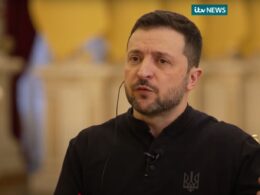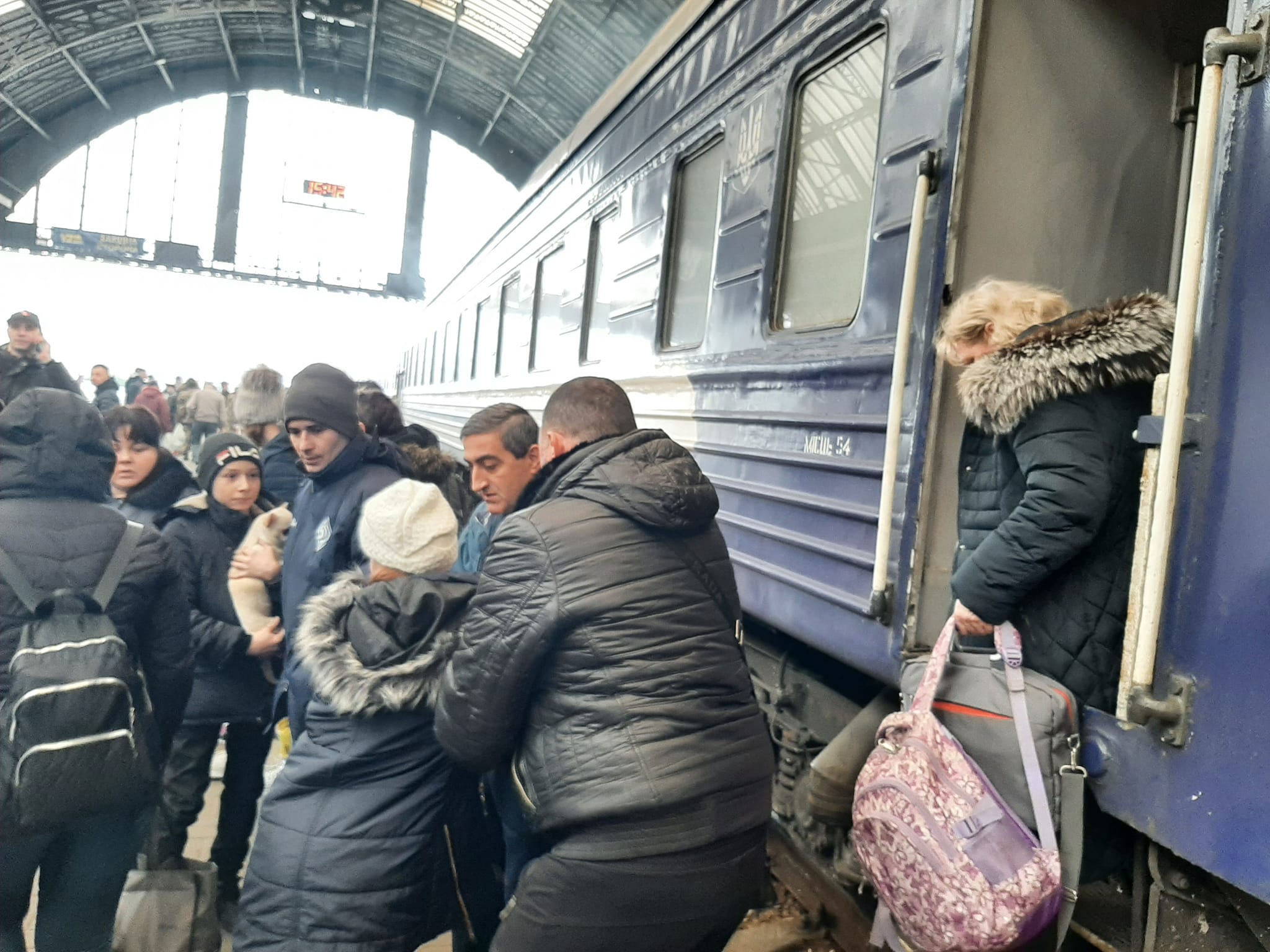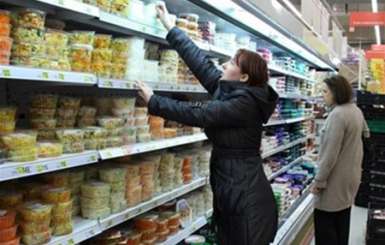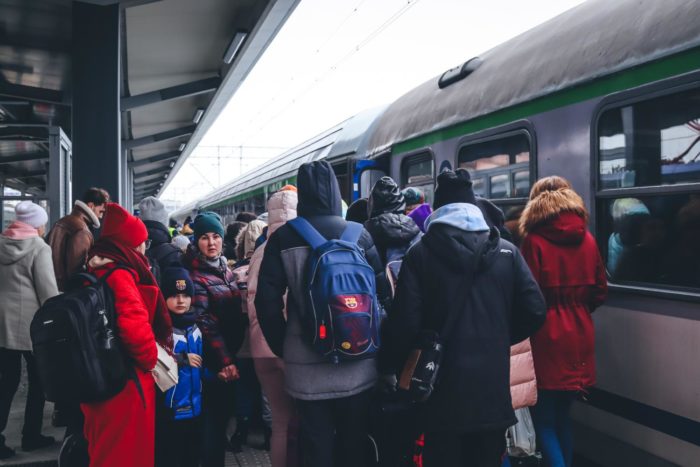The sixth national poll "Adaptation of Ukrainians to the war conditions" was conducted on March 19, 2022 by the Sociological Group “Rating.”
Rebuilding Ukraine
The survey shows that two-thirds of the citizens of Ukraine hope that it will be possible to rebuild Ukraine’s infrastructure and economy in less than five years after the war. 13% think it is possible to do over a year, while 51% think it will take up to five years. 18% believe that rebuilding the infrastructure and the economy will take up to ten years. There are not many skeptics who believe that the recovery will take more than ten years: only 10%.
The younger respondents and the residents of the western regions of Ukraine are more optimistic about the rapid reconstruction. Those who had to leave their cities also demonstrate optimism regarding the recovery process.
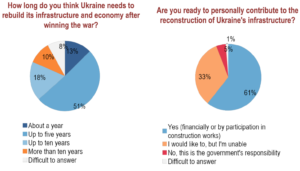
61% of the respondents are ready to personally contribute to the reconstruction of Ukraine's infrastructure: financially or by participating in construction works. A third of the respondents would like to contribute to the rebuilding of the infrastructure, but cannot. Only 5% believe that this is solely the responsibility of the government, not the people. More than 70% of men are ready to join the reconstruction compared to half of the women. Those who have left their city at the moment are more willing to join the reconstruction.
Ukrainians think Russia must compensate for destructions
90% are convinced that it is Russia that must compensate all the expenses for the reconstruction of Ukraine after the war. 20% believe that international organizations or European countries should invest in it, 12%, that the United States should do this, and 10%, that Ukraine itself should do this.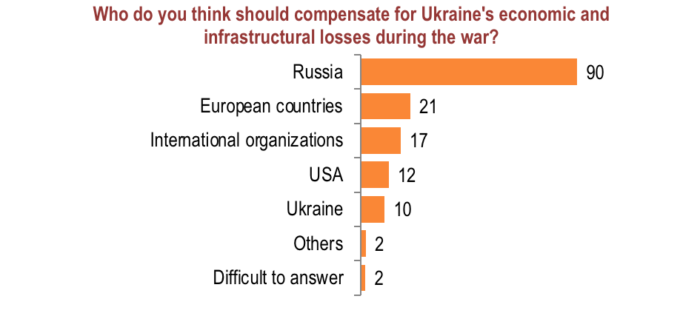
What Ukrainians think and feel about the war
One out of two respondents say they have a proactive position toward their own lives at the moment. One out of five say that their life position is neither active nor passive. A third of the respondents said that they have virtually no effect on their lives now. The younger respondents, men, and those who continue working have a proactive attitude in their lives more often.
Those who believe they have no impact on anything at the moment experience more pronounced negative emotions than people with a proactive attitude.
43% of the population feel aggressive at the moment, while 38% do not. The rest of the emotions are experienced by the minority of the respondents: 27% feel pessimistic, while 47% do not, and 31% feel despaired, while 53% do not. Only 17% say they feel apathetic, while 66% do not.
Apathy, despair, and pessimism are more pronounced among the residents of the East of Ukraine, while aggression, on the contrary, is more present in the Center and in the West. Women are more likely than men to experience negative emotions except aggression, which is more pronounced among men. In addition, senior respondents are experiencing negative emotions more at the moment.
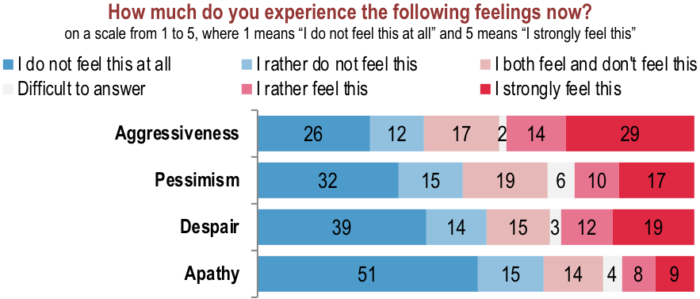
Interestingly, those whose homes have been damaged do not experience more negative emotions than others. But those who do not know what happened to their homes experience more pronounced of despair, apathy, and pessimism because of the uncertainty.
Those who had to part with their family or partner due to the war, as well as those who communicate with their relatives and friends less frequently experience more negative emotions.
60% believe in God and do not doubt His existence. 14% believe in God, but have some doubts, while 17% do not believe in God, but believe in other higher powers. Only 6% identify themselves as total atheists. Compared to the pre-war period, the share of those who believe in God and do not doubt His existence has not changed. The highest level of religiosity is traditionally observed in the West of the country, among the elderly and among women.
Working during the war
Among those who previously had a job, 45% continue to work during the war, including 22% who are working as usual, 21% who are working part time or remotely, and 2% who even got a new job. 53% of the respondents who were employed before the war are currently unemployed. In the western regions, there is a bigger share of those who did not lose their jobs (47%). In the South, they comprise about 40%, and in the East, less than 25%. About half of the respondents who remained in their cities are employed. Among those who left their cities, about a third keep working, with 5% of them having already found a new job. There are also slightly more employees who work as usual among the senior workers; many of them may be working in the critical infrastructure.
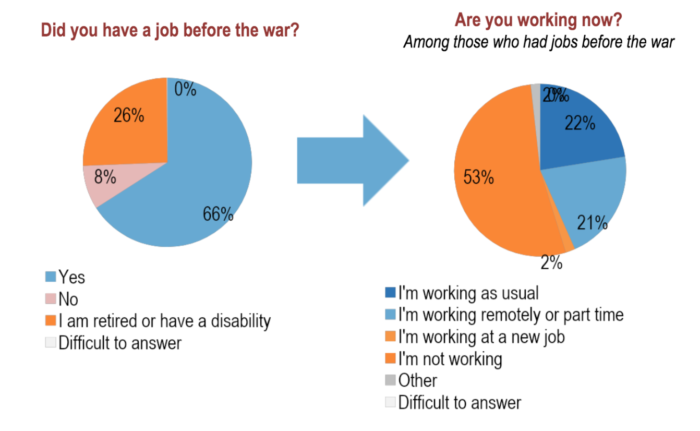
Those who lost their jobs during the war feel apathy, despair and pessimism more than those who continue working now.
What Ukrainians are planning to do after the war?
About half of the respondents intend either to travel around the country or to obtain additional education or new knowledge after the war. A third want to learn a new profession, a quarter want to start a business or to get a pet, and one in five are ready to change their job. At the same time, only 8% want to change their place of residence within Ukraine, and only 3% want to leave Ukraine.
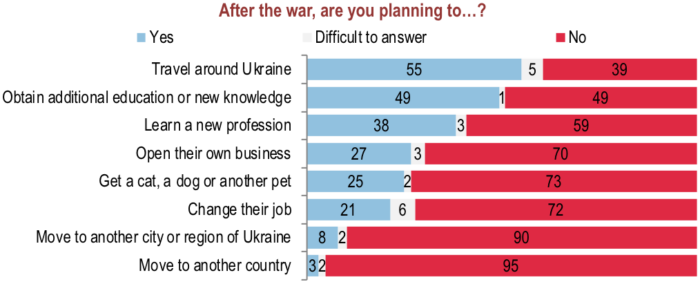
The economic situation of Ukrainian families
The economic situation of the families of 18% of the respondents did not change during the war. For 28%, it rather got worse, and for 52%, got definitely worse. The economic situation of the residents of the eastern regions, as well as of those who lost their jobs since the war started, has deteriorated the most. On the other hand, more than a quarter of retirees say their economic situation has not changed, probably because they continue to receive benefits from the government.
In case they lose their source of income, 53% of the respondents have savings for several months or more: for 25%, their savings will be enough for up to 2 months, for 13%, up to three months, and for 15%, up to six months or more.
40% of the respondents have savings for less than a month, but this share is smaller compared to the quarantine crisis of 2020. Back then, the share of those who had limited savings was 55%. The younger respondents have bigger savings than the older ones. The situation is also better in the western and central oblasts, as the residents of the eastern and southern regions may have already lost their jobs and started spending their savings more intensively.
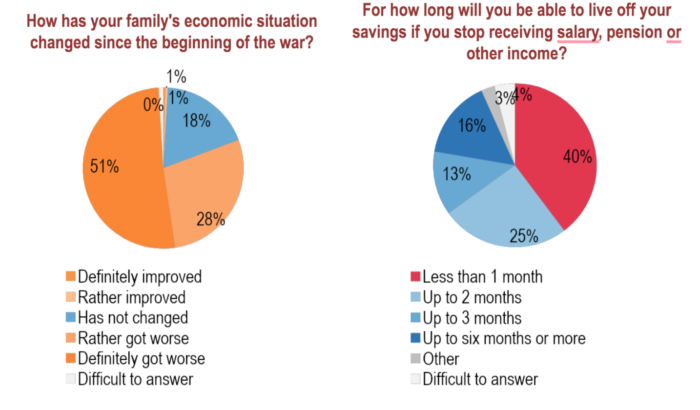
The respondents most often communicate with their family members and close ones (72%, constantly, and 18%, often). 48% constantly communicate with their friends, while 23% communicate with them often. 38% constantly talk to neighbors, and 17%, often. 28% communicate constantly with colleagues at work, and 16%, often. Interestingly, compared to the first lockdown in 2020, despite the difficult times, the respondents are much more active in communication with family and friends.
The frequency of communication with relatives remains virtually the same regardless of the region and age. The residents of the East and the West as well as the youngest and the oldest ones speak with their friends slightly more often. The youngest respondents and those who have left their cities speak with their neighbors least often.
How many Ukrainians left their home?
44% of the respondents said they had to temporarily separate from their family or partner because of the war. The highest shares of such people are in the eastern and central regions and among young people.
19% of the respondents (adults) said they had to leave their city or village because of the war. The highest share of such respondents is in the East of Ukraine (35%). In the Center and South of Ukraine, one in five or six was forced to leave their place of residence, and in the West, almost one in ten. About a third of young respondents left their city or village. Among those who became refugees, 93% plan to return to their home towns after the war, while 5% do not, and 2% are unsure.
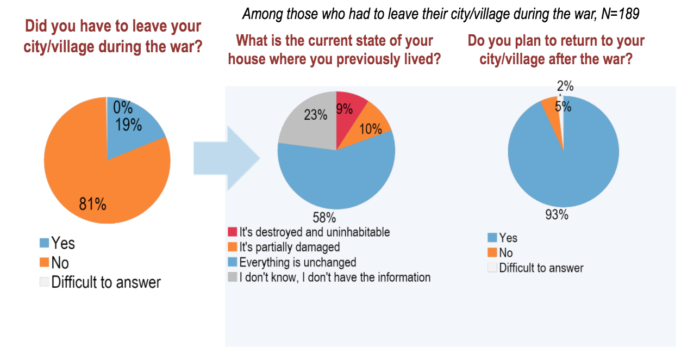
News during the war
Compared to the pre-war times, the role of Ukrainian TV, groups and channels in messengers, the radio, as well as one of relatives and friends as the sources of information about the events in Ukraine has increased. TV is a source of information about the events in Ukraine for 62% of the respondents, internet sites, for 47%, groups, and channels in messengers, for 42%, social networks, for 37%, relatives and acquaintances, for 28%, and regional television and radio, for 15% to 16%.
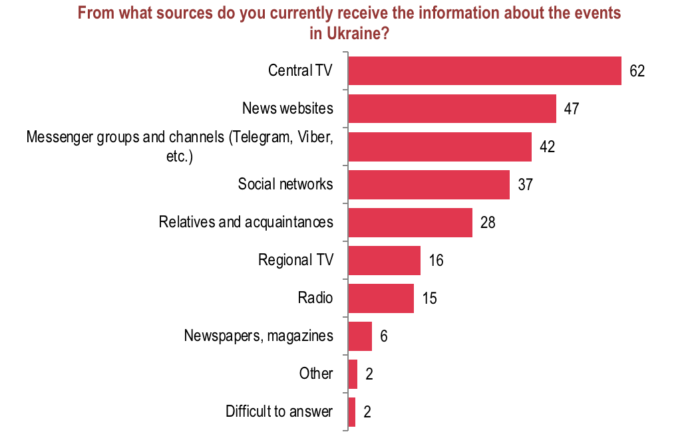
The respondents in the West and in the Center of Ukraine use the TV and the radio more frequently. In the East, on the other hand, the frequency of hearing news from relatives and acquaintances has increased.
. Survey method: CATI (Computer Assisted Telephone Interviews). Error of representativeness of the study with the confidence level of 0.95: not more than 3.1%. Dates: March 19th, 2022.
See the previous polls:
- More Ukrainians support military alliance with UK & Poland than NATO accession, poll shows
- 60% of Ukrainians believe Ukraine will defeat Russia in weeks, 80% contribute to defense: poll
- Ukrainians overwhelmingly support their army and Zelenskyy, expect to defeat Russia, but want more help from West, five new polls show
- Over 80% of Ukrainians want to return occupied Crimea and Donbas; 72% in support of joining NATO – poll
- Support for NATO, EU, and Zelenskyy skyrockets after Russian invasion of Ukraine


